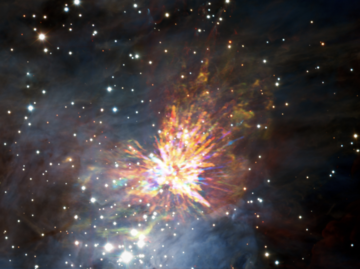2023/08/31
The Institute of Astrophysics at Pontificia Universidad Católica de Chile (IA-PUC) invites applications to our Ph.D. (4-yr) and Master’s (2-yr) programs, beginning March 2024, from talented students with undergraduate backgrounds in all areas of astrophysics and physics, or closely related fields (see https://astro.uc.cl/). Program Details: One of the leading astronomy centers in Latin America. Active and dynamic international community comprising ~15 faculty, ~20 postdocs, and ~60 graduate students. Cutting-edge observational and theoretical research in cosmology; extragalactic, galactic and stellar astrophysics; stellar and planetary dynamics; astrochemistry; high-energy astrophysics; numerical simulations; and astronomical instrumentation. 10% privileged access to a wide array of world-class observing facilities in Chile. Rich and vibrant scientific life including mentorship with world-class faculty, weekly seminars and colloquia, daily journal-club discussion, group meetings, strong visitor program, and travel to national and international conferences, all of which offer plentiful opportunities for networking and collaboration at many levels. Guaranteed external or internal 4-yr scholarships to all accepted Ph.D. applicants, and a limited number of internal 2-yr scholarships to exceptional Master's degree applicants. Includes stipend for living expenses plus tuition and fees. Funding for travel, research, publications and computers. English is the default language of the Institute. Provide advanced training as a professional researcher, who will be able to compete effectively for academic positions if s/he chooses to do so, or pivot into observatory or industry careers. Requirements: Applicants should have an undergraduate and/or master’s degree in Astronomy (or closely related fields), full-time commitment, and a good command of the English language. Previous research experience is beneficial. Application materials: Cover letter outlining applicant’s motivation to train as a researcher in astrophysics, and in particular at IA-PUC in the Ph.D. or Master’s program, research experience (if any), research interests, and career plans and goals (max 2 pages). Curriculum Vitae (max 3 pages, including any publications). A minimum of 2 and a maximum of 3 letters of recommendation sent directly by the recommenders, written in Spanish or English, by people who know the applicant well and can give a thorough assessment of the candidate’s strengths and weaknesses (e.g., classwork, teaching, investigation, and personal character). Recommenders will receive an automatic email on where to upload their letters. Copy of official undergraduate (and graduate, if available) academic transcripts, translated into English or Spanish if necessary, and a clear indication of the grading scale system and the student's ranking within their class. Copy of title, academic degree certificate, or an official letter from their University indicating expected graduation date. Any other information that the student would like to add: e.g., results of some standardized test such as the GRE and/or TOEFL. All application materials (aside from letters of recommendation) should be submitted via our application form. Shortlisted applicants will be scheduled for interviews. All questions should be directed to gradapp@astro.puc.cl. Important deadlines: Application Deadline: Thursday, August 31, 2023. Selection Deadline: Wednesday, October 25, 2023. IA-PUC is committed to equal opportunity and diversity in its workforce, including but not limited to religious freedom.

 Es el grupo de radioastrónomos del IRyA y sus estudiantes. Nos reunimos cada 15 días con el objetivo de compartir experiencias, resultados recientes, resúmenes de congresos, etc. La imagen muestra uno de los resultados de los investigadores del grupo, basada en datos del Atacama Large Millimeter/submillimeter Array del flujo explosivo de Orion BN/KL (Bally, Zapata et al. 2017).
Es el grupo de radioastrónomos del IRyA y sus estudiantes. Nos reunimos cada 15 días con el objetivo de compartir experiencias, resultados recientes, resúmenes de congresos, etc. La imagen muestra uno de los resultados de los investigadores del grupo, basada en datos del Atacama Large Millimeter/submillimeter Array del flujo explosivo de Orion BN/KL (Bally, Zapata et al. 2017).